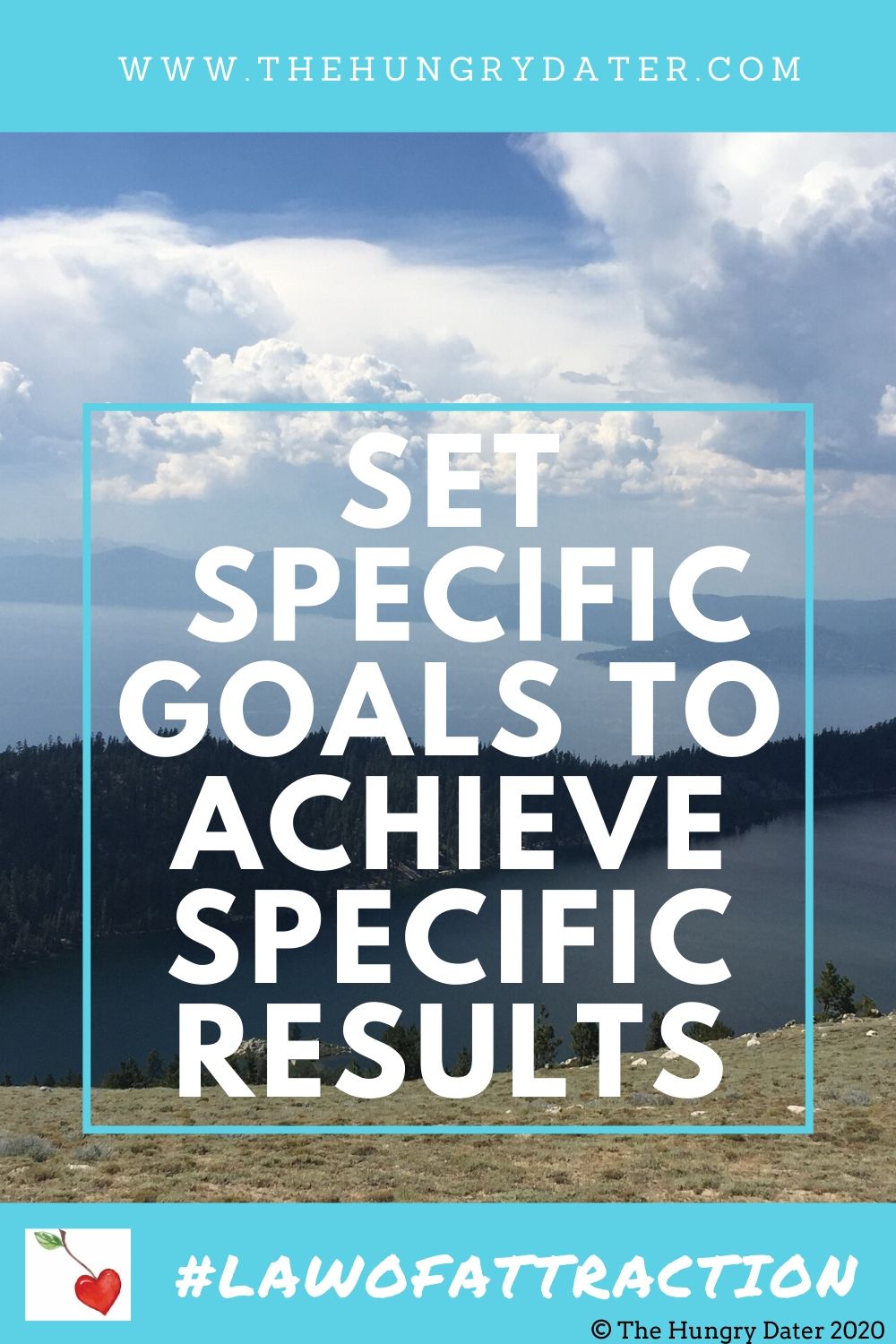“Vague goals produce vague results.” This is a major theme in the teachings of both Jen Sincero (You Are a Badass) and Jack Canfield (The Success Principles). They are two of my favorite teachers in the world of living your best life. So the deal is, the more specific the goals, the better your results will be.

I can’t thank you all enough for your patience with me. This New Year. I’ve been tested to utilize my own teachings a LOT. Subsequently, I’ve really struggled with staying on top of things here at THD. But as promised, here is the post on “specific goals” originally planned for the first week in January (and here we are in the first week of February–insert eyeroll here):
New Years’ Resolutions…
The beginning of the year is a great time for those of us who are looking to re-affirm our commitments to living our best lives. However, New Years is a time when most people create “resolutions.” All too often those resolutions are forgotten with the start of February and the promise of spring. I just read the other day the top 10 resolutions are as follows (as reported by Time online here):

- Lose Weight and Get Fit
- Quit Smoking
- Learn Something New
- Eat Healthier and Diet
- Get Out of Debt and Save Money
- Spend More Time with Family
- Travel to New Places
- Be Less Stressed
- Volunteer
- Drink Less
Now, don’t get me wrong, this is a great list. And if New Years is what it takes for us to better our lives and the world, I’m all for that. However, what I’ve noticed with these “resolutions” is people don’t stick with them because they really aren’t goals. And what’s more–they aren’t specific.
Resolutions? Nope. GOALS!
As we’ve discussed in the series “Attracting ‘the One’ with the Law of Attraction,” the Universe wants us to have exactly the life we want. However, it’s difficult (both for us and for the Universe) to hone in on exactly what that is if we haven’t thought it out with specific goals or visions in mind.
“Specific goals” seems like such an easy concept. Then you get into it and realize there is a LOT to specificity. Jack Canfield, author of The Success Principles (buy your copy here), says that he will have his clients make their “specific” goals and then he helps them whittle them down even 5 or 6 times further. He does so by asking detailed questions about what the client really means. The questions include timeline, type, detail, places, people, and numbers.
Specificity
Resolutions don’t usually offer this kind of specificity. “Lose Weight and Get Fit” leaves a lot to be desired. This is why I really think New Years resolutions should be changed to “Goals for the New Year.” And while I had intended and planned for this post to be in January, perhaps it’s fitting it’s being posted in February as that is the time when these “resolutions” tend to start waning. But because these aren’t resolutions, they’re goals, hopefully starting in February will push us through that February drop off. We want our goals to stick.
I have always liked making goals. I like the process of sitting down, dreaming out my best life, and making a written plan of how I’m going to get there. But make no mistake, it still isn’t easy for me to make the goals specific enough to really make a dent. Even for someone like me who not only likes making goals but who has studied these principles extensively (and teaches them to others), the specificity can be really difficult to nail down.
Specificity: Harder than it Looks
My problem lies with making specific goals. I find that even when I think my goals are specific, they aren’t specific enough to show the Universe what I really want and need. I know that if Jack ever took any of my goals that I have already whittled down significantly, he’d have roughly 1800 more questions which would make the goals even more specific within minutes.
So now that it’s February and all the “resolution” making is out of all our systems, this really is a great month to sit down and make our new goals and make sure they are as specific as possible so our new lives can begin!
The best way to go about getting your goals as specific as possible is to sit down just like you would on any other goal making day. Write down between 5 and 10 of your best goals for the month, the year, the decade, or just your life in general. Don’t worry about specificity right away, just write the goals as they come to you. Make sure they are important to you. You can even take the resolution list you may have made last month and turn them into goals.

First Pass
Once you have your goals written down as they’re supposed to be, go back and reread them. Look at them with a new eye and see where maybe you’re being vague. The first on the list of resolutions is a great example: “Lose Weight and Get Fit” is really vague. As you look at your goals with a more careful eye, go back through and write more specifics below each goal. In the previous example, some great ways you could specify are 1) how much weight; 2) what does fitness mean to you? Is it a body fat percentage, how much you can bench press, how much you weigh, or how often you go to the gym? These will all give you insights into making a better goal for yourself; and 3) how much time are you giving yourself to achieve your goal? Once you look inside yourself and get more specific answers to these specific questions, you’ll be better on your way to more specific goals and more specific results.
Look Deeper…
After you answer these questions around your original goals, look at the goals and the answers as a whole and re-write your goals with the specifics included. For instance, in our above example, you may have written “1) lose 20 lbs.; 2) be able to do 10 pull ups and have a BMI below 25; 3) I want to do this in 6 months.” These are all much more specific answers. So when you look at your original goal “Lose Weight and Get Fit” in addition to your new answers, your new, more specific goal may be something along the lines of “I want to lose 20 lbs., have a BMI below 25, and be able to do 10 pull ups: all in 6 months.”
Aaaaaaaand DEEPER.
Obviously, this is much more specific. However, here is where Jack would tell you it still isn’t good enough. And once he started asking you more questions, you’d feel silly that you thought it was so specific initially. He’d say, “How are you going to lose that weight? What habits do you need to develop? Are you going to run, eat better, go to the gym? If so, what specific eating habits are you going to cultivate? How many vegetable servings will you eat every day? Will you run a certain number of miles per week? How often? What time on what days will you go to the gym? If you want a BMI below 25, does that mean you want it to be 24.99? Or is there a specific number you want? “In six months?” Six months from when? What date and time will you expect for your 20 lbs. to be absolutely off your body? How do you plan to train to do pull ups?
It gets to the point where it seems ridiculous. But the exercise speaks for itself. Suddenly we realize we’ve been “ho-humming” our way through our goal making–which, when you think about it, is one of THE most important things of our lives when it comes to living your best life.
Specificity is Loooooooooooooooong
One of the things I’ve noticed with these specific goals is, I used to make a goal that was a line or so long. They could easily be made to be a list because a single-lined goal makes a great bullet point. But what I discovered in using these new goal-making skills is, real goals–the specific ones that actually get results–are actually quite long. They should be like writing an entire paragraph of plans, times, numbers, and instructions.
After you get your goal down, go back one more time and look at the language you’ve used. Did you say things like “I want to” or “I’ll try”? If so, that’s the next change that has to be made. These goals have to be written like it’s already done. “At 10:30 a.m. on August 5, 2020, I weigh 150 lbs and can do 10 pull ups. To get there I’m going to the gym Mondays, Wednesdays, and Fridays at 6:30 a.m., rain or shine, for one hour to be spent on the treadmill, pull up machine, weight room, and stationary bike in 4 circuits of 15 minutes, switching the weight exercises every week.”
Even after you get your whole paragraph down, it may behoove you to take a week and go back and look to make sure you haven’t missed anything.
Conclusion? Worth it Work.
If this seems like a lot of work, it is. But what I’ve learned is that if you REALLY want a different life, if it’s really important enough to you, the work shouldn’t feel onerous. In fact, it should be fun! In addition, in making these goals–making sure your language is specific and as if it’s already happened–you’re actually able to practice a lot of the other Law of Attraction skills that will help bring your goals closer. You’ll be forced to visualize your life and what it will be like when you achieve your goals. You’ll pay super close attention to your language (positive only, people!), and you can even make sure to write these goals from a place of gratitude. All these skills will bring them closer.
If you have questions, make sure to comment below.
Happy belated New Years! And happy goal making! The Universe wants this for you. Don’t ever forget that. Go get ’em!!!